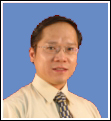
Senior Instructor, Department of Computer & Information Science (DCIS)

|
Vat Kam Hou 屈鑑濠 Senior Instructor, Department of Computer & Information Science (DCIS) |
Assessing Online Learning: Strategies, Challenges and Opportunities
|
As online education moves into the mainstream of the higher education ecosystem, one question still persists: “How do I know what my online students have learned?” There are no easy answers, just as there aren’t in face-to-face courses, but with a little creativity and flexibility, you soon discover that the online learning environment opens up a host of new educational assessment possibilities.Of course, just as with traditional courses, the trick to online assessment is finding the right combination that works best for your particular course. This special report Assessing Online Learning: Strategies, Challenges and Opportunities will show you how. This special report features 12 articles from Online Classroom that will cause you to examine your current methods of online assessment, and perhaps add something new to your assessment toolbox. It even talks about some of the common assessment mistakes you’ll want to avoid. Take a look at some of the articles will find in Assessing Online Learning: Strategies, Challenges and Opportunities:
|
In addition to illustrating how well students meet the expected learning outcomes, well-planned assessment can provide valuable insights for course and program improvement, and can serve as a bargaining tool for resource allocation and compensation negotiation. Online courses enable a strong student-centered approach to learning and, as a result, assessment. We hope this report helps you design and develop online assessment strategies that take full advantage of the many formal and informal assessment tools now at your fingertips. Assessing Online Learning: Strategies, Challenges and Opportunities features a variety of assessment methods, some that have been adapted from proven on-campus practices and some that are have been created specifically for the online classroom. If you want insight into how to assess online learning at the course, program, and institutional levels, you’ll want to download Assessing Online Learning: Strategies, Challenges and Opportunities a new special report that will help you create more effective online assessment exercises and strategies. |
Educational Assessment: Designing a System for More Meaningful Results |
Assessing institutional effectiveness is a noble pursuit, but measuring student learning is not always easy. As with so many things we try to quantify, there’s much more to learning than a number in a datasheet.When it comes to assessment. Sometimes there are more questions than answers, even after you get the results. How do you define success? Using Assessment Data to Inform and Reform |
This special report Educational Assessment: Designing a System for More Meaningful Results features articles from Academic Leader, and looks at the assessment issue from a variety of different angles to help you a strong assessment program.
Whether you’re looking to completely change your approach to assessment, or simply improve the efficacy of your current assessment processes, we hope this report will help guide your discussions and eventual decisions. |
Put to the Test: Making Sense of Educational Assessment |
Educational assessment is one of the most talked about topics in higher education today. Despite the admirable goal of improving student learning, the trend toward greater accountability through increased academic testing carries with it a diverse range of educational assessment tools, methodologies, perspectives, and stakeholders.If today’s mandates for educational testing has you searching for answers, you’ll want to download this FREE special report Put to the Test: Making Sense of Educational Assessment, developed to share best practices and current thinking on educational assessment in higher education.On one side of the educational assessment debate, you have faculty who feel all these new educational assessment requirements stifle their academic freedom without providing truly meaningful data to justify the additional workload it generates. On the other side of the educational assessment debate are those educators who accept the fact that educational assessment is here to stay and believe that, with careful planning, it’s possible to design exactly the type of assessment systems needed to get an accurate picture of student learning outcomes. No matter which side you’re on … or somewhere in between … you’ll find Put to the Test: Making Sense of Educational Assessment is a great resource for understanding the best practices and current thinking on educational assessment in higher education. |
Here’s just a sample of the insightful articles featured in Put to the Test: Making Sense of Educational Assessment:
Best of all, this 22-page Special Report is absolutely free. Whether you’re a new faculty member looking to incorporate assessment into your classes, or an experienced member of a departmental or institutional assessment team, this special report will provide you with valuable strategies and thought-provoking ideas from educators who have successfully implemented assessment programs at their institutions. Put to the Test: Making Sense of Educational Assessment is yours free when you sign up for Faculty Focus, the new online information resource for faculty in the higher education industry. |
Go to: Dr. Vat's FST Homepage | Recommended Items (Page 0 |1 | 2 | 3 | 5 | 6 | 7 | 8 | 9)
Kam Hou Vat, PhD
Faculty of Science and Technology
University of Macau
Av. Padre Tomás Pereira, Taipa,
Macau, China
Room: N327C
Telephone: (Office) (853) 8397-4379, (Mobile) (853) 66501747
Fax: (Office) (853) 28838314 or (Home) (853) 28832731
Email: fstkhv
Personal Homepage: http://www.fst.umac.mo/en/staff/fstkhv.html
Downloadable: CV | Short Profile
Visitor Counter: